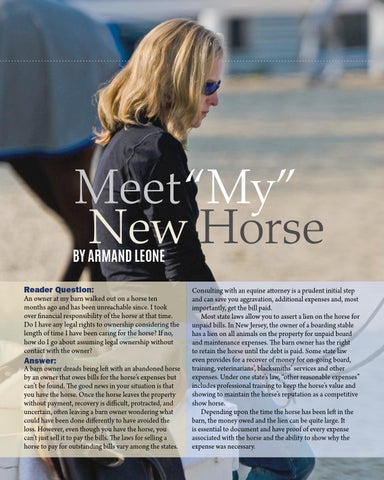42 • THE PLAID HORSE
Meet “My” New Horse
BY ARMAND LEONE Reader Question:
An owner at my barn walked out on a horse ten months ago and has been unreachable since. I took over financial responsibility of the horse at that time. Do I have any legal rights to ownership considering the length of time I have been caring for the horse? If no, how do I go about assuming legal ownership without contact with the owner?
Answer:
A barn owner dreads being left with an abandoned horse by an owner that owes bills for the horse’s expenses but can’t be found. The good news in your situation is that you have the horse. Once the horse leaves the property without payment, recovery is difficult, protracted, and uncertain, often leaving a barn owner wondering what could have been done differently to have avoided the loss. However, even though you have the horse, you can’t just sell it to pay the bills. The laws for selling a horse to pay for outstanding bills vary among the states.
Consulting with an equine attorney is a prudent initial step and can save you aggravation, additional expenses and, most importantly, get the bill paid. Most state laws allow you to assert a lien on the horse for unpaid bills. In New Jersey, the owner of a boarding stable has a lien on all animals on the property for unpaid board and maintenance expenses. The barn owner has the right to retain the horse until the debt is paid. Some state law even provides for a recover of money for on-going board, training, veterinarians’, blacksmiths’ services and other expenses. Under one state’s law, “other reasonable expenses” includes professional training to keep the horse’s value and showing to maintain the horse’s reputation as a competitive show horse. Depending upon the time the horse has been left in the barn, the money owed and the lien can be quite large. It is essential to document and have proof of every expense associated with the horse and the ability to show why the expense was necessary.
